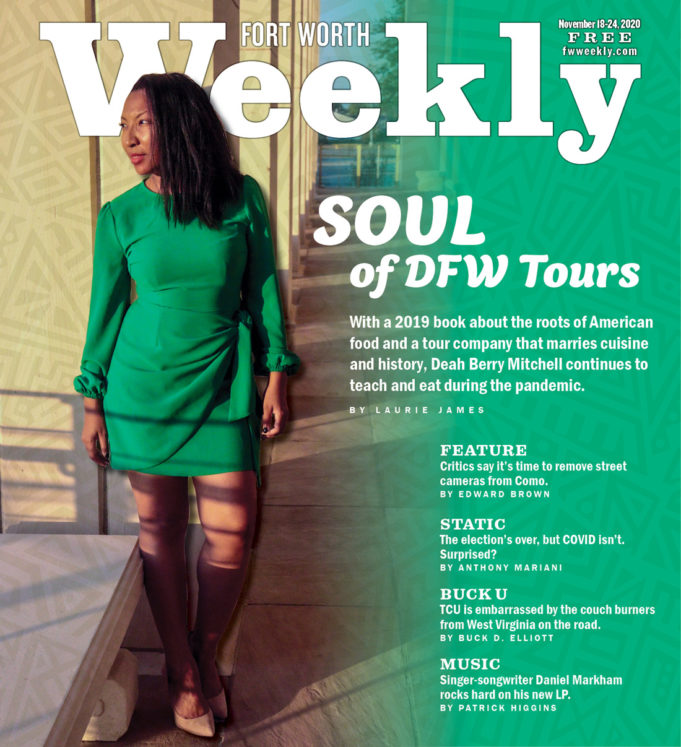Deah Berry Mitchell launched Soul of DFW Tours in 2018 because she believed that a spoonful of history goes down better on a full stomach. The concept is simple: Hop on a bus, stop at a historical site, get back on the bus, and go to one of the area’s beloved restaurants. Repeat a few times, making new friends as you get fuller and smarter.
“I wanted to take what I love –– food and history –– and use it as a tool to educate my community about the Black experience,” Mitchell said. Soul of DFW is “a celebration of culture, not just eating.”
Mitchell created the touring company and later partnered with writer/publicist Dalila Thomas as she expanded from Dallas into Fort Worth in January 2020. The tours take history buffs and local food lovers alike to Fort Worth’s Black-owned restaurants and historical sites of significance, including the Antioch Missionary Baptist Church and Oakwood Cemetery.
“I understand that sometimes the subject matter is heavy,” Mitchell said. “It’s never all history or all food. We purposely break up the tour to keep the mood balanced.”
Mitchell and Thomas had just hit their stride in terms of touring in Fort Worth when COVID shut down any event involving enclosed spaces. Mitchell said she hopes to ramp back up again in the spring.

Jordan Pitts Photography
A native of Sherman, Mitchell is a 2019 transplant to Fort Worth. She dived into the history of her new hometown with gusto, starting with Opal Lee, the woman acknowledged by many as the city’s de facto Black historian. Mitchell also credits Sarah Walker from the Lenora Rolla Heritage Center Museum for providing perspective. The museum is named for the woman who founded the Tarrant County Black Historical and Genealogical Society, and it’s a gold mine if you’re looking for the history of Fort Worth’s Black citizens.
As for the food in the Fort, Mitchell didn’t have a problem picking favorites. She likes Carpenter’s Cafe and cites perennial favorite Drew’s Place Soul Food for their fried chicken. She also calls them unique “because they have an app.”
There are, she said, “a ton of great restaurants I’m looking forward to trying.”
Mitchell and Thomas mix stops at some of our best restaurants (Mama E’s, Smoke-A-Holics) with visits to the history in our backyards that many of us don’t know. For instance, you’ve probably passed the McDonald YMCA dozens of times, but did you know it’s named for the first Black man to own a hotel in Fort Worth? William “Gooseneck” McDonald was born to enslaved parents, and he amassed a fortune as an educator, banker, politician, and entrepreneur.
“We stop on the tour [at the McDonald Y] because they have a tribute wall to him,” Mitchell said. “Physically, you can see the trajectory of his life.”
Mitchell merged her love of Southern culinary tradition and history in Cornbread & Collard Greens: How West African Cuisine and Slavery Influenced Soul Food. Her 2019 book details how the slave trade that originated in West Africa influenced cooking styles in the American South and all over. She describes the book as “a beginner’s guide to the culinary history of soul food.” But it’s not all history.
“One-third [of the book] is me telling my stories and how I’m connected to a food item,” she said.
If you’re a food writer, or you just love food, Mitchell is a hoot to spend a few hours with. We got into a discussion about yam casserole for Thanksgiving, and I will never look at the dish I make with “yams” and marshmallows the same way again.
“Not many people know that yams and sweet potatoes are drastically different,” she said. Apparently, what I’ve been calling yams are not yams, despite the label at Whole Foods.
“Yams are from a specific region in Africa, and they were eaten mashed,” Mitchell said. “Due to slave trade, Africans used the food of the American South, and where sweet potatoes were commonly grown, people found they had a similar texture to yams.”
But Mitchell promises that she doesn’t correct her relatives when they bring the candied yams to the holiday dinner, even though those are really sweet potatoes.
That’s what makes Mitchell so engaging: She’s smart and funny, but she knows when to put the brakes on the history lesson. In addition to the traditional area soul food favorites, Mitchell’s list includes a couple of vegan restaurants. This shouldn’t surprise anyone, because much of the cuisine in both Africa and the American South for enslaved people was vegetable-heavy. She likes It’s So Vegan in southwest Grand Prairie because of the variety of food.
“If you want nachos or something that feels more like a Southern dinner, [the owner] has different vegan meals that allow you to feel like you’re hitting those cravings,” she said.
Mitchell also likes Rebirth of Food –– the vegan restaurant and meal-planning service –– off Oakland Boulevard.
Cornbread & Collard Greens: How West African Cuisine and Slavery Influenced Soul Food is available at Amazon, Target, and now in the gift shop of the Mississippi Civil Rights Museum, which was a bit of news that brightened Mitchell’s 2020. Look for the Soul of DFW bus tours to ramp back up in 2021.













This is so awesome! Such a talented woman!
I hope that I am able to take this tour once the pandemic is over. This article helps me to see that there is so much to learn in regards to our history and influence.
You do such amazing work, Deah! I cannot wait until I’m in the DFW area again!
An AWESOME work being done by a thoughtful and courageous facilitator. Can’t wait to tour. Keep up the great work Deah!!!
This is incredible!
I am so proud of this lady! She has goals and I have always loved her passion. I will take a tour with you soon. I always love your cookbook. I will cook and post for you soon. It may be on an episode of Nailed It but whatever to make you laugh. Congrats!
This is EXCITING!! So happy for you!!
What a great article! I love this tour and the history shared. Bravo Deah!
This is so awesome!! I can’t wait to experience the tour!
This is so Awesome!!!! You Go Girl!
So excited for you! Walk into your destiny!
You should see what recipes you can do with yams. It’s a staple food in Africa really. Great article.